385 Search Results for complex communication
December 7, 2016
by Carole Zangari -
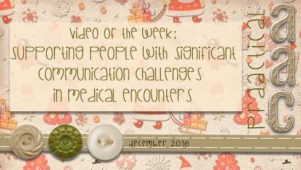
Encounters with healthcare providers can range from the mundane (e.g., getting a prescription filled) and routine (e.g., doctor’s appointment) to situations which are more complicated and urgent (e.g., Emergency Room visit, hospital stay). People who use AAC are part of a larger group of individuals whose communication challenges make these situations more complex. In today’s featured video, Dr. David Beukelman discusses ways in which effective communication between patients with communication challenges and their healthcare providers can be supported. This video was part of the USSAAC webinar series, which is made possible through the support of ISAAC. Many thanks to those organizations and the Patient Provider Communication organization whose free resources and information are shared in the presentation. Please consider joining and supporting these organizations so that they can continue to serve the AAC community with information, advocacy, and resources like these. Direct Link to Video – https://www.youtube.com/watch?v=Uxd-hWODfm8
April 18, 2016
by Carole Zangari -
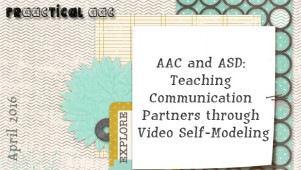
It is an honor to have Dr. Joanne Cafiero, an AAC consultant for individuals with complex communication needs and Autism Spectrum Disorders, as a guest contributor for today’s post. Dr. Cafiero is the author of Meaningful Exchanges for People with Autism an Introduction to AAC (2005). She is a consulting editor for Focus on Autism and Other Developmental Disabilities and has guest edited several of ASHA’s Perspectives in AAC. She was a member of the National Academy of Sciences Committee on Educational Interventions for Children with Autism (2001) and is currently working on an update on AAC and Autism for the Academy. In this post, she shares some of her work on video self-modeling. ::::::::::::::::::::::::::::::::::::::::::::::::: Growing research and first-person reports are illuminating the unique sensory and motor differences experienced by people on the Autism Spectrum. This new information has a huge impact on the AAC practitioner. Motor planning differences in ASD can... [Read More...]
March 10, 2016
by Carole Zangari -
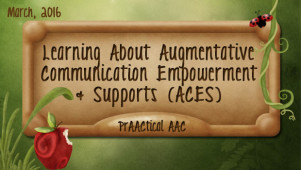
Is it summer yet? Not where we live, but that doesn’t stop us from making plans. In today’s post, we hear about the Summer 2016 Augmentative Communication Empowerment and Supports (ACES) Program at Temple University which will run from July 18-29, 2016. SLP Kathryn Helland, AAC Services Coordinator at the Institute on Disabilities at Temple University, shares information on this innovative program for young adults who use AAC. Kathryn provides training, AAC evaluations, device demonstrations, and AT consultations to consumers of Pennsylvania’s Initiative on Assistive Technology (PIAT). True to its name, this program has a rich tradition of changing lives and empowering adults who use AAC. ——————————————————– ACES – What’s it all about? It is a steamy hot day at the end of July. Temple University’s already diverse campus is further enriched by the presence of students in wheelchairs. They sit, chatting under the ginkgo biloba trees. They are all young adults, with... [Read More...]
December 28, 2014
by Carole Zangari -
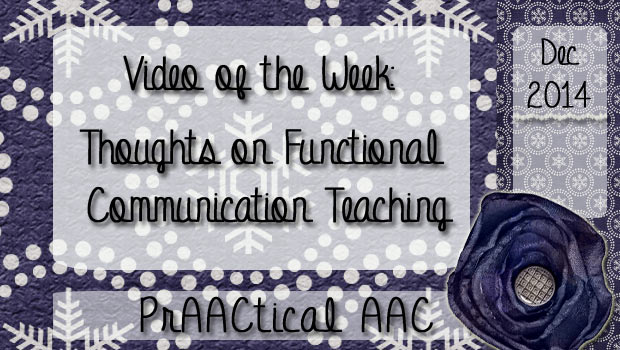
“Behavior is communication.” We’ve all heard it, but knowing what to do help a learner communicate effectively in less stressful, more socially appropriate ways is a complex issue that is best addressed through teamwork and collaboration. In this video, Rob Haupt shares some basic thoughts on Functional Communication Teaching from an ABA perspectivie.
June 19, 2014
by Carole Zangari -
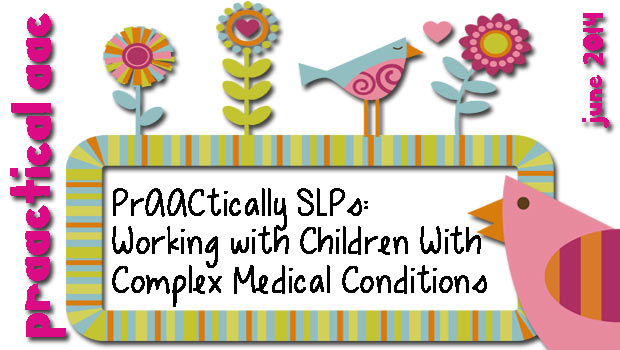
We are pleased to be sharing another post by a graduate student SLP. Stephanie Amundsen attends the SLP program at the University of Central Florida (UCF) and has worked for the Florida Alliance for Assistive Services and Technology (FAAST) Atlantic Regional Demonstration Center (ARDC) since May 2012. She is currently completing an externship working with children with complex communication needs, and is writing her thesis on AAC access in acute and sub-acute facilities. She has presented posters on service learning using AAC intervention and grammatical intervention using AAC under the direction of Dr. Kent-Walsh at the 2013 ASHA Convention, and has volunteered at the Assistive Technology Industry Association (ATIA) Conference in 2013 and 2014. :::::::::::::::::::::::::::::::::::::::::::::::::::::: As a graduate student placed in my first externship, I encountered multiple clients with AAC needs from day one. Because one of my placement sites is a Prescribed Pediatric Extended Care (PPEC) facility, many... [Read More...]
May 30, 2014
by Robin Parker -
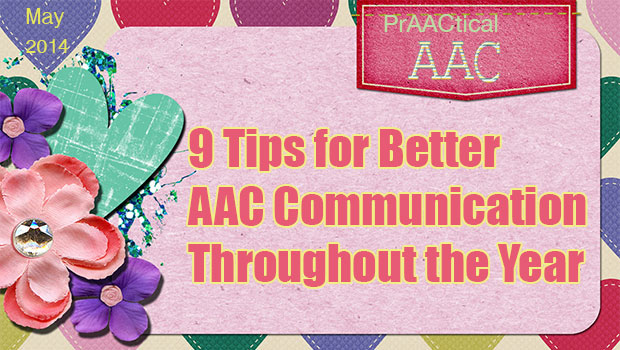
Although Better Hearing and Speech Month is ending, we want to continue best prAACtices in all teaching interactions throughout the year. Here are 9 AAC facilitator tips to help with this goal. Provide Aided Language Input (ALI)– ALI is modeling AAC style. Speak AAC to the AAC user. Use Scaffolding– Scaffolding is a verbal and visual strategy that has the facilitator build upon prior knowledge of the learner in order for the learner to integrate a new concept or skill. Model words and concepts to add information onto what the AAC user already knows and uses. Provide Expansions and Extensions– A form of modeling. Add a word to the spontaneous communication from the learner. The facilitator models a conceptual or grammatical word in the form of a model. Use Recasting– Recasts serve to add or correct information without obstructing the natural flow of communication. Recasting is another form of modelling. The... [Read More...]
January 23, 2014
by Carole Zangari -
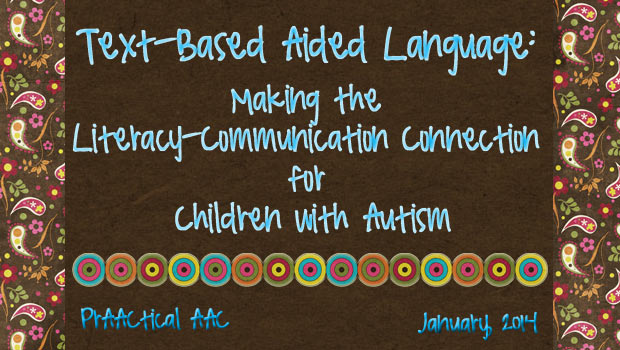
We are so pleased to have this guest post by Alicia Garcia. She is the lead SLP at AAC Clinic at One Kids Place, in Ontario. You can read her previous post here. Today, Alicia takes us in a textual direction. Enjoy! When working with children with autism who have complex communication needs we have found it is not uncommon to see children who, despite having significant communication and language challenges, can read and sometimes type words. Their ability to decode written words is far superior to their ability to communicate their wants, needs and thoughts. Some of these children use AAC systems for their face-to-face communication and, in some cases, have a literacy program in place; they frequently have handy access to writing or typing tools. These children do not, however, use text to communicate with people. They have not made the Literacy-Communication connection. We wonder… how do we help these... [Read More...]
May 30, 2013
by Carole Zangari -
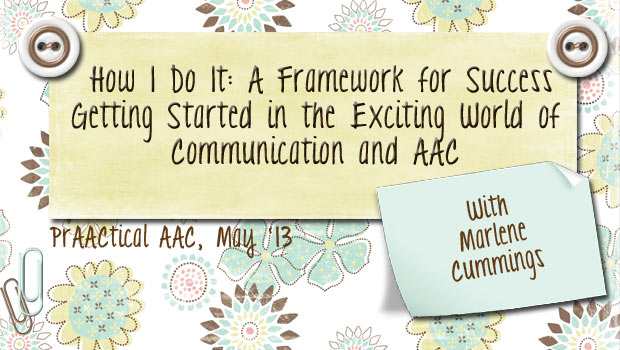
We couldn’t be more excited to have a return visit from Marlene Cummings, a wonderful SLP who is currently serving as an AAC Consultant to the AAC Team at Oakland Schools. In her first post, Marlene talked about strategies for cultivating the right mindset for AAC teaching. In this post, Marlene continues sharing elements of her Framework for Success in discussing the Knowledge Toolbox, developed with the Oakland Schools AAC Team. 5 Things in Your “Knowledge Toolbox” What is already in my “knowledge toolbox” of communication, language and learning? Yes, you do have a full toolbox. You just don’t realize it. And of course there are always new and exciting things to add. You already know this stuff!! REMEMBER??? It is important to step back and think broadly about communication and what it really does. Sometimes we get caught in the details of our work and can’t see the forest through the... [Read More...]
December 22, 2012
by Robin Parker -
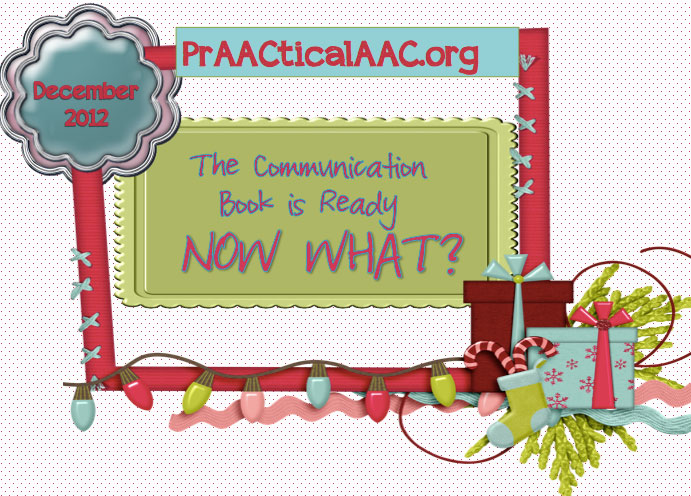
The Communication Book is Ready… Now What? The fun begins…. Yes, we really do think that TEACHING a learner to USE the communication book is FUN. We get to participate in lots of meaningful language experiences, we get to be creative, we get to watch language blossom, and we get to be surprised by the communication competence ALL of our learners show us after prAACtice, prAACtice, and for some more prAACtice . The best way to get started with communication book teaching is to begin by trying out different teaching tips, strategies, and resources and find out what works best. Each communication dyad (communicator & communication partner) is different so the combination of strategies that will work will vary but at the core of the teaching process, there should be fun, motivation, and of course progress. STRATEGIES and CONSIDERATIONS Aided Language Input (ALI)– We can not say enough about... [Read More...]
May 2, 2025
by Carole Zangari -

On the first Friday of each month, we publish a post in Spanish by guest author Claudia Marimón to highlight AAC work being done in Spanish-speaking countries and offer translations of material that can help families and service providers. In this month’s post, Claudia addresses a key aspect of AAC services, assessment of people with complex communication needs. :::::::::::::::::::::::::::::::::::::::::::::::::::::::::::::::::::::::::::::::::::::::::::::::::::::::::::::::::::::::::::::::::::::::::::::::::::::::::::::::::::::::::: Este mes queremos acercar a la comunidad hispanohablante un tema clave para avanzar en una implementación efectiva de la Comunicación Aumentativa y Alternativa (CAA): la evaluación. La evaluación en CAA no es solo un primer paso, sino un proceso fundamental para reconocer, comprender y potenciar las competencias comunicativas de personas que enfrentan desafíos en su comunicación cotidiana. Evaluar implica mirar más allá de lo evidente, observar cómo la persona ya se comunica, interpretar sus intenciones, comprender su contexto y descubrir todo el potencial que puede desarrollarse con los apoyos adecuados. Contar... [Read More...]









